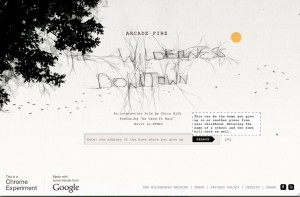We all know about the risks of credit card theft. But few of us know how it really works. This revealing, chilling report from NPR’s Planet Money takes you to an online marketplace for stolen numbers. It may change forever the way you see those plastic cards in your wallet. (A 4-minute NPR story includes excerpts from the longer podcast.)
Radio story • Podcast
Category: -Multimedia
Categories
-Multimedia 15.0 Alan Turing, Military Intelligence, and Intelligent Machines 15.1 Thinking About Thinking Machines 15.2 Natural-Language Communication 15.5 Question-Answering Machines 15.6 The Robot Revolution 4.4 The User Interface: The Human-Machine Connection 4.7 Inventing the Future: Tomorrow's User Interfaces I 5.4 Beyond the Printed Page 8.5 Interpersonal Computing: From Communication to Communities 9.3 Internet Issues: Ethical and Political Dilemmas
Conversations with Robots
Be careful–you may be falling in love with a software robot. This episode of Radiolab—NPR’s clever and entertaining broadcast/podcast—explores many ways people talk to machines, including those alluring bots that populate online dating sites. Eliza, Furbie, Clever Bot, Bina—they’re all talking to us, and we’re listening. Radiolab puts it all in perspective in this fascinating program.
Many of the greatest works of art are inaccessible to most of the world’s population. In this short TED talk, Google’s Amid Sood demonstrates Art Project, a multimedia web gateway to many of world’s foremost art museums and the treasures they hold.
[ted id=1144]
Most of the e-books published so far have been on-screen versions of paper books. In this short TED presentation, Mike Matas gives us a peek at the possibilities when digital books combine state-of-the-art interactive multimedia with compelling text.
[ted id=1134]
 This groundbreaking music “video” by Chris Milk combines music, art, and interactive Web technology to create a deeply personal experience. You may need to switch Web browsers to make the experimental HTML 5 technology work, but it’s worth the effort.
This groundbreaking music “video” by Chris Milk combines music, art, and interactive Web technology to create a deeply personal experience. You may need to switch Web browsers to make the experimental HTML 5 technology work, but it’s worth the effort.Robotic cars aren’t just science fiction fantasies anymore. This short presentation takes you on a road trip in Google’s amazing driverless car as it navigates through crowded city streets and curvy mountain roads. Sebastian Thrun suggests that our roads will be much safer when we let machines do the driving. What do you think?
[ted id=1109]
Two people sitting next to each other in a coffee house can get wildly different results from the same Google search. Many Facebook users see only posts from friends who agree with them because Facebook is hiding posts from other friends. These two sites, and many others, use filtering software to personalize our Web experience. In this short, thought-provoking talk, Eli Pariser said this software is rapidly creating a world in which “the Internet is showing us what it thinks we want to see, but not necessarily what we need to see.”
[ted id=1091]